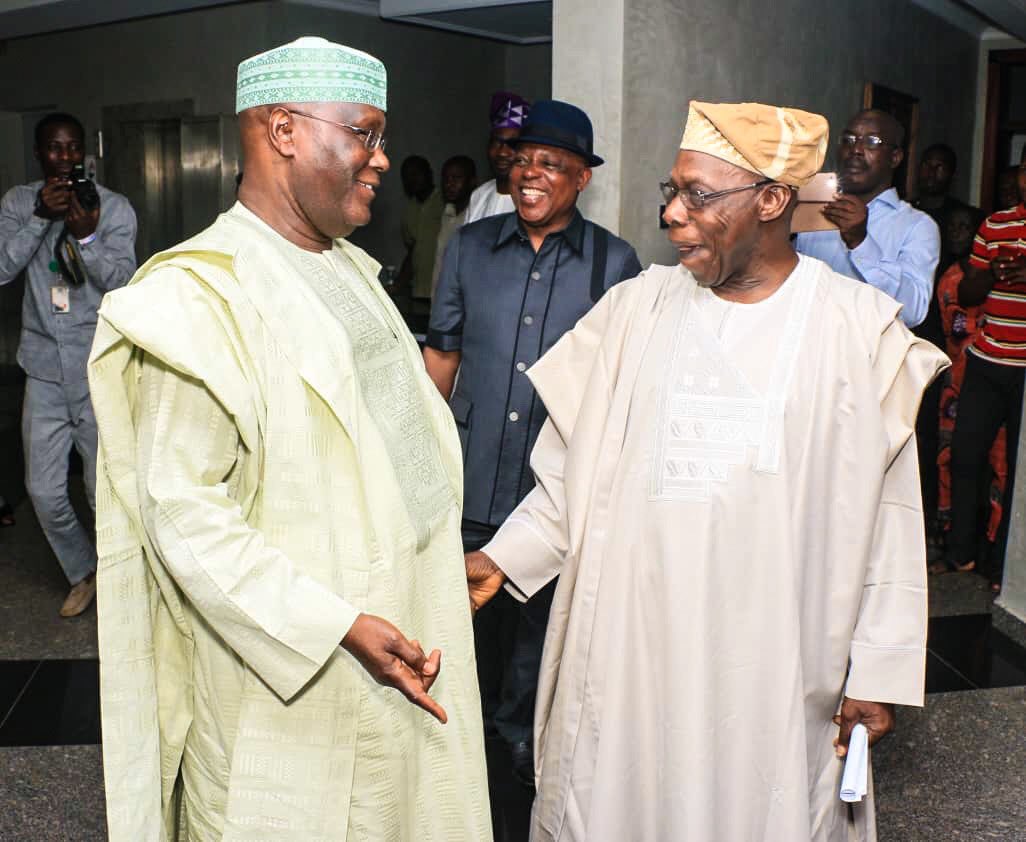By Adagbo ONOJA

The ‘reconciliation’ that did not go anywhere
The founding moment of the Obasanjo/Atiku love-hate relationship would be difficult to pinpoint immediately but early 1999 remains the turning point in that now conflictual inter-face. Obasanjo had won the presidential ticket of the People’s Democratic Party, (PDP) that year but before the party could reflect on the convention and the question of the Vice-President, the presidential candidate had made his move. By Atiku’s testimony years ago in a ThisDay interview, Obasanjo called him and wanted to know if he, (Atiku) would always obey him. Atiku answered yes, making the point that obeying Obasanjo is what the late Gen Shehu Yar’Adua had asked them to do. Obasanjo then asked him to go and tell the late Chief Solomon Lar who was the party’s pioneer Chairperson that he, (Atiku) is the Vice-presidential candidate.
It was unimaginable that a presidential candidate fielded by a star studded party as the PDP then was would singlehandedly make the decision about who became his deputy. This is more so when the emergent PDP had a slate that emerged from the consultative process among the three or so dominant tendencies that merged to form it. The late Abubakar Rimi was highly favoured for Veepeeship on that slate. Obasanjo upturned that slate. The PDP could not protest this because Obasanjo’s candidature had already brought about ideological, ethnic and religious cracks within the party. Today, some scholars of the PDP note that decision by Obasanjo as the starting point of the falling apart of the PDP because once that decision came to stand, Obasanjo could go on subsequently to overwrite the party, including his introduction of privatization which none of the tendencies that negotiated the PDP ever contemplated.
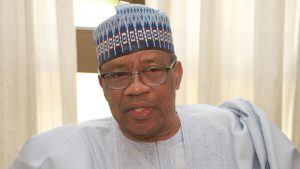
IBB, the chief tactician of the Super – 5, lost his ‘investment’ in Obasanjo
Obasanjo and Atiku appeared to have blended well in the first term but the seeds of tension had been sown by the manner of that selection of a deputy. Atiku who was aware that the calculation of the Super-5 (TY Danjuma, IBB, Abdulsalami and Gusau with Obasanjo still in prison then) who prompted the formation of the PDP was for Obasanjo to do just one term, stabilize the post-June 12 chaos and get off started planning how he would succeed Obasanjo. Obasanjo has repeatedly said that part of the plan was the planting of stories in the media by Atiku’s media establishment encouraging Obasanjo to follow the Mandela option of quitting after one term. Atiku was also believed to have started structuring the PDP in a manner that could guarantee his ascendancy in the event of Obasanjo’s departure in May 2003, taking the party farther away from its original moorings. It is not clear whether Atiku knew or did not know that Obasanjo had decided to burst the idea of spending just a term and leaving the stage for an IBB or anyone else. As Obasanjo made for re-election, he encountered trouncing in the field of politics in which he was relatively alien. Some statesmen had to manage to save him from impeachment. He had alienated all else in the Super – 5 (General Danjuma had basically left the government; Obasanjo had blocked IBB and Gen Gusau was no longer that comfortable in the government. The governors were more comfortable with a more ‘generous’ Atiku who didn’t lecture them the way Obasanjo carried on).
Only Chief Audu Ogbeh was now Obasanjo’s credible crisis manager in addition to what his Chief of Staff – Gen Abdullahi Mohammed – could do. Ogbe and Adamu Ciroma saved Obasanjo, at a great cost in the case of Adamu Ciroma who could no longer enter Kaduna, totally controlled by Buharites. Obasanjo secured a second term by, according to Buharites, rigging the election blatantly, the same thing Buhari did in 2019. Buharites believe that if the media, the civil society, the critics and the campaigners did not ‘see’ what Obasanjo did in 2003, they should also be able to absorb his own rigging in 2019.
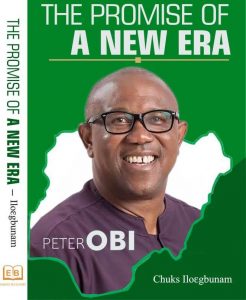
Obi, Obasanjo’s candidate versus Atiku Abubakar in 2023
Once the second term was in the kitty, Obasanjo now unfolded on Atiku but it was a disaster. Each step he took, Atiku matched it, whether in documentary warfare or charges of immorality and corruption or whatever. Atiku’s strength in the media, in the judiciary and even in academia was at par if not superior to Obasanjo’s, consolidating Atiku’s membership of the club of individuals in Nigeria called ‘republics within the republic’. For four years, Obasanjo could neither get Atiku impeached or convicted of any charges so as to get him out of the way. At the end of the tenure, he wrote a review – My Watch – in which Atiku came out terribly bruised. Atiku’s intellectuals did write their own version in which Obasanjo is no less bruised but have, somehow, not released it contrary to the plan to do so almost immediately Obasanjo did his.
The book may not have been released because of the kind of ‘reconciliation’ between the two which occurred on the eve of the 2019 presidential contest. Today, that ‘reconciliation’ has evaporated and the two are back to the battlefield, with the 2023 presidential contest as the hottest site of the never ending feud between the two. Between 2003 and 2007 when they fought, Nigeria suffered. No researcher has delved into the outcomes of that conflict but it would shock people if and when such a research is conducted. The consequences of the 2023 phase of their never endless attrition may be greater this time. Peter Obi’s victory will be Obasanjo’s defeat of Atiku. On the other hand, Atiku’s victory will be his defeat of his boss at last. Given the match between them in past skirmishes, ordinary Nigerians may have to pray because each side will put in everything into the feuding.
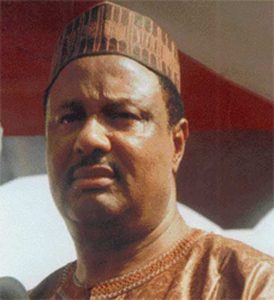
Bypassed by Obasanjo in 1999
So far, Obasanjo seems to be ahead. Whether he has a hand or not in Peter Obi’s schematised pull out from the PDP and the post-Convention split in the PDP, they are good news for him. Apart from the Soludo outburst, Obi and, by implication, Obasanjo has not suffered such damage. When people reflect on the abrupt way Peter Obi left the PDP to offer himself as a presidential candidate, the memory that they fall back on is that of the Obasanjo/Atiku warfare. However, Atiku has a history of devastating retaliation against even an Obasanjo. Already, some analysts are pointing at their feud as the reason for the impossibility of a more systematically planned coming of a presidential candidate of Igbo identity, systematically planned to act as a complete closure of issues related to the Civil War. If Atiku and Obasanjo were not feuding, that pair might have been the tripod on which such a possibility would have rested. And this is how it would have happened.
After being locked out of power for decades for taking up arms against Nigeria, it was expected that the making of a Nigerian president of Igbo origin would be by a deliberate, behind-the-scene elite decision. That is, the most strategic elite figures in such political make-up exercises would meet, decide on an Igbo politician, convince all others planning to contend for power to step down as was done in 1998/99 and then make the election of such a candidate an all-involving national project. This is what the temporary unity of the Super – 5 achieved in 1998/1999. The credit must be given to them for taking Obasanjo straight from prison to power by convincing everyone else to drop their presidential ambition. There was a split in the PDP over this because the National Party of Nigeria, (NPN) elements in the party stuck with the original position that, in the absence of Shagari, the next presidential material had to be Dr. Alex Ekwueme. If the Super – 5 had not smashed Ekwueme’s candidacy, the idea of an Igbo president by deliberate, behind-the-scene elite consensus would have been achieved then.
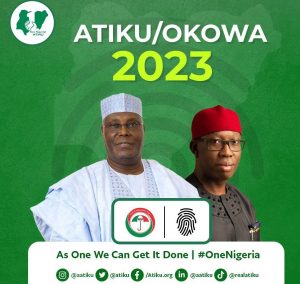
A man and his many battles in the struggle for power
In 1998/99, the Super – 5 argued that an Ekwueme presidency was not tenable because it is not the practice worldwide to have a president from the cultural identity which took up arms against the state when elements of the federal forces who fought them to a defeat are still alive and active. General Danjuma gave The Guardian an interview in 2007 in which he explained this further from the angle that affected him because some smart Alecs were linking his rating of Ekwueme as hatred for Igbos. The Ekwueme/NPN elements in the PDP were defeated in the Jos Convention of the PDP early 1999 but Obasanjo who was sensitive to what preceded his victory decided to smoothen things by offering Dr. Ekwueme the position of the Senate President right there at the Convention. Ekwueme rejected it and Obasanjo must have felt slighted at that independent mindedness.
It is easy to speculate that this approach was not attempted or did not work this time because Obasanjo and Atiku are at war, Obasanjo and Buhari are not very much together. IBB is always amenable to his bosses – Obasanjo and Danjuma but they are all moving in different directions. Although it would be interesting to know how far Obasanjo and General Danjuma went before they failed to accomplish an elite consensus on a Nigerian president of Igbo origin once they have decided that Nigeria is now ripe for an Igbo president. Is it possible they are so fragmented that a discussion of this between the Super – 5, Buhari and a few other actors was not even contemplated? IBB and Abdulsalmi could not have been that opposed to such a consensus that Obasanjo and General Danjuma could not have convinced them. As things are, Obi could win the 2023 presidential contest but even if that were to happen, his victory would not pass the same grand, symbolic message that making him president by national acclamation would have passed. President by national acclamation does not always fulfil everyone’s expectation of it but the renewal it brings has no alternative or equal.
Instead of renewal, the Inspector-General of Police is alerting the nation to trouble ahead just as INEC, the US and the British are also doing. Who knows if the Obasanjo/Atiku feud is not one of the plausible sources of the trouble they are warning against, especially if Tinubu does not break the stalemate? Every four years, the nation must appear to be heading for a break just because a president, some less than a thousand federal legislators and some 36 governors are to be elected. Nigeria should be gone beyond that by now. It is already too late but if only the two warriors can spare a moment for those for whom a meal a day is a problem. Election as a source of bitterness and frustration ought to have been a bygone by now.

